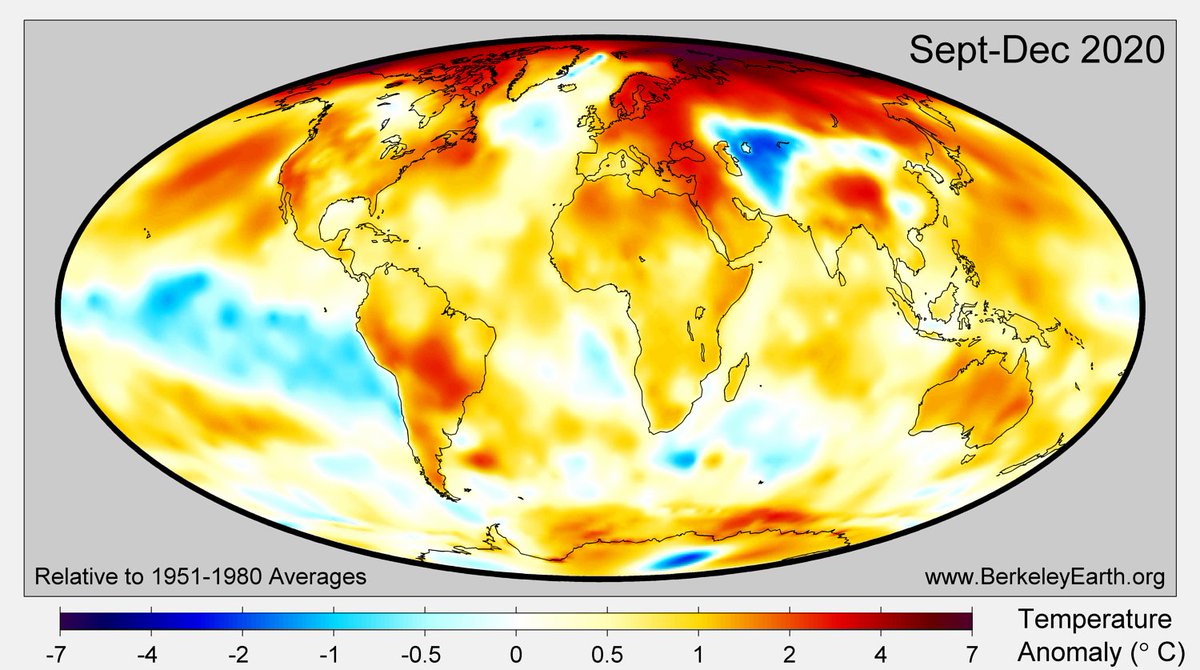THREAD) Berkeley Earth's 2020 Temperature Report
2020 was nominally the second warmest year since direct observations began, slightly cooler than 2016.
Last year set a new record for the warmest year on land, but only the 4th warmest in the oceans. http://berkeleyearth.org/global-temperature-report-for-2020
2020 was nominally the second warmest year since direct observations began, slightly cooler than 2016.
Last year set a new record for the warmest year on land, but only the 4th warmest in the oceans. http://berkeleyearth.org/global-temperature-report-for-2020
Widespread recording of temperatures began more than 170 years ago, since then the Earth has warmed about 1.2 °C (2.2 °F).
2020 was nearly tied with 2016 as the warmest year, coming in only 0.02 °C cooler, less than the margin of uncertainty. /2
2020 was nearly tied with 2016 as the warmest year, coming in only 0.02 °C cooler, less than the margin of uncertainty. /2
While we often discuss global mean temperatures, combining the land and oceans, nearly everyone lives on the land.
Since 1850, the average land has warmed about 1.9 °C (3.4 °F), and 2020 had unambiguously the warmest land average yet observed. 3/
Since 1850, the average land has warmed about 1.9 °C (3.4 °F), and 2020 had unambiguously the warmest land average yet observed. 3/
As one expects from the ongoing process of global warming, 2020 was marked by above average temperatures nearly everywhere, but conditions were especially extreme across Northern Asia. 4/
In 2020, 10% of the Earth's surface experienced a new record high for annual average temperature.
Yet again, there were no regions with a record cold annual average. 5/
Yet again, there were no regions with a record cold annual average. 5/
In 2020, we estimate that 45 countries set a new record high for national annual average temperature, indicated on the following chart by circles with dark outlines.
Examples of countries setting new records include France, Japan, Mexico, and Russia. 6/
Examples of countries setting new records include France, Japan, Mexico, and Russia. 6/
Russia, in particular, smashed their previous record for annual average temperature, reaching nearly 4 °C (7 °F) above pre-industrial norms, and breaking the previous record by 1.2 °C (2.2 °F).
It is not normal for new records to be set by such a large margin. 7/
It is not normal for new records to be set by such a large margin. 7/
While warmth over Asia was driving global averages higher, the other large process affecting 2020's global average was the emergence of a moderate La Niña late in the year.
La Niña is shown here by the cool averages in the Western Pacific from September to December. 8/
La Niña is shown here by the cool averages in the Western Pacific from September to December. 8/
The emergence of the La Niña condition in the second half of 2020 drove ocean-average temperatures sharply lower in recent months.
Without this cooling, 2020 would likely have surpassed 2016 and become the warmest year instead of only being the second warmest. 9/
Without this cooling, 2020 would likely have surpassed 2016 and become the warmest year instead of only being the second warmest. 9/

 Read on Twitter
Read on Twitter









